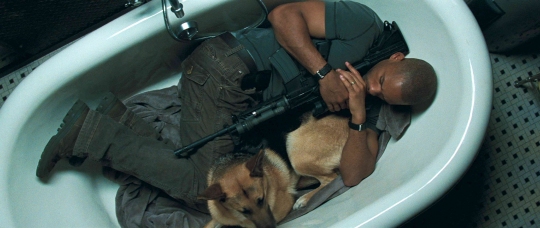Most seemingly intelligent person would probably have you believe that television and cinema are for the brainless masses and that books are the only acceptable form in which to be fed works of fiction. At the dawn of every new book-to-movie creation, elitists cry foul at every single tiny discontinuity that conflicts with the original source material. Perhaps sometimes these overzealous fanboys have a point; an author does have a lot more pages to work with than a director does time. Sometimes the minor intricacies that make up a character, or the internal struggles that they face, or even the distinct voice of the author are what gives a novel life. Without these small, yet vital details, some books would cease to be the same. This is not to say, however, that a seemingly "unfilmable" book cannot, in fact, be turned into the cinema masterpiece that it deserves to be. Just go watch "The Lord of the Rings" trilogy if you don't believe me. It may have taken fifty years to finally have been done justice, but it certainly proved that a work of such epic scale has just as much place on the silver screen as it does in print.
This is also not to say that the a standalone film cannot be just as excellent on its own merit as the countless classic novels that are out there. Sometimes there are just things that a director, screenwriter, or actor is able to put into their work that an author cannot. This is why I propose to you the idea of the unwritable movie; a movie that works only because of its creators' acute mastery of the visual experience. The greatness of Memento, for example, achieves much of its uniqueness from the way Christopher Nolan decided to tell his tale: backwards. The uncertainty that surely everyone feels at the conclusion of the movie is really only attainable because of the lack of an author. The viewer sees events how they happen, nothing more and nothing less than that, and definitely no narrator outside of the story attempting to spell out the mystery for them. Just like Leonard must really on the facts, so too must anyone watching the movie, for they only know as much as he does. This lack of narration has its place in an entirely different scenario, as well.

In I Am Legend (no I am not calling this movie a masterpiece), what sane human being did not feel at least incredibly awful when Robert Neville was forced to kill his dog - his only friend left in the entire world. Though I won't say that this level of emotion can't be achieved in writing, there's something about the lack of words that creates the scene. With no writing or words to focus on, there is only the actions and emotion of the characters to be dealt with. And if it's dealt with correctly, it can turn into quite the potent batch of emotion.

Lastly I come to just pure cinamatography. So I'm sure no one will argue that a book of The Matrix would be pretty pointless (though I'd probably still read it), but that's not really the type of cinematography I'm talking about. Take Eternal Sunshine of the Spotless Mind, for example. The heart of the movie is truly in the tale of two lovers who only have so much time left before they've completely forgotten about each other. However, much of the films charm is due to the strange combinations of Joel Barish's dreams and the initial shock given when they start to collapse around him and Clementine. These sequences serve to display Joel's desperation in his desire to hold on to clementine, yet are still merely framing the interactions between the dying couple. It's a careful balancing act between the shock of the surrealism and the tender moments between Joel and Clementine. The balance is achieved by placing half of the burden on the visuals and half on the words. I believe both aspects would be greatly damaged if an author was forced to simultaneously attempt to portray both.

So that's all I've got on the subject so far. To be honest I think I have too much faith in amazing authors to really to this topic justice. I also realize that perhaps you don't completely agree with my choice in movies, and that's perfectly fine as well (though I hate to say that we can't be friends anymore). Really what I'm trying to say is that film are every bit as credible as pieces of art and as means of storytelling as books are.
Just FYI, I agree perfectly well with your choice in movies.
ReplyDeleteIn my opinion, books (the good ones, anyways) should not be formed into films unless the directors and actors can do the novel justice. There's nothing worse than a having a favorite scene that was written as heart-wrenching turn out to be laughable. Or just pathetic.
But on the other hand, film captures the human emotion in an easier way than words can/do. Film allows audience to see a certain person's interpretation of a work. It's easier. It's set in stone. This character looks like this, speaks like this, walks like this, etc. With text, it's up to the author's diction and the willing audience have to work together to form characters.
just saying.
I, personally, enjoy watching a movie before reading the book because then you don't go in with false expectations and hopes that will, of course, be torn apart in some form or fashion. I think books are meant to be read, nothing more. I think movies are meant to be seen, nothing more. I'd like to see no more books turned into movies because it ruins the book for me. EVERY. SINGLE. TIME. Either that, or just remind me to not read the book before I go see it... hahaha Good posting though, OLIVIER! Made me think!
ReplyDelete